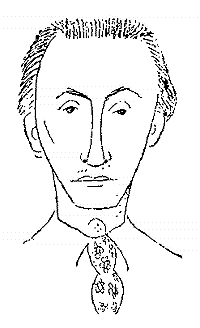
|
April 1998 | Jacket 3 Contents | Homepage | Catalog | Search | E l i o t W e i n b e r g e ron Omar Cáceres |
|
This piece is 1,300 words or about four printed pages long
All the stories from the capitals have grown familiar, but where are the histories and accounts of modernism as it was lived and practiced in the provinces? Latin America, for example, in the first half of the century, has shelves of unwritten magical realist literary biographies: The Peruvian Martín Adán, whose first book made him famous at twenty, and who then checked himself into an insane asylum, where he lived for another sixty years, writing on scraps of paper he threw away that were dutifully collected by the orderlies and sent to his publisher. Jorge Cuesta, a poet and the leading Mexican critic of the 1930’s, who castrated and slowly fatally poisoned himself as part of his alchemical experiments. Carlos Oquendo de Amat, a Lima street kid who published one book, 5 Meters of Poems, on a folded sheet of paper five meters long, then gave up writing to join the Communist Party, and bounced in and out of jails and tuberculosis wards in a half-dozen countries before dying in Spain just before the civil war. Joaquin Pasos, a Nicaraguan who also died young, who wrote Poems of a Young Man Who Has Never Traveled about the places he hadn’t seen; Poems of a Young Man Who Has Never Been in Love, which are all love poems; and Poems of a Young Man Who Doesn’t Speak English, which were written in English. Felisberto Hernández, a writer of stories unlike any others, more associative than narrative, who lived with his mother and wrote in a windowless basement, who paid for the publication of his books by playing the piano in bars in the Uruguayan hinterland, and who died so fat the funeral home had to remove a window to get the coffin out. |

|
|
In 1934, his brother paid for the publication of a book of fifteen poems, Defense of the Idol (Defensa del ídolo). The book, somehow, had an introduction by Vicente Huidobro, the only one he ever wrote for another poet, though it is unlikely the two met. (Could it be a forgery?) Cáceres, disturbed by some typographical errors in the book, burned all the copies he could find. Only two are known to survive. In 1943, the exact date is unknown, he was murdered by assailants unknown for reasons unknown. All that remains of his work are those fifteen poems and a statement, ‘I, Old and New Words,’ that he wrote for the anthology. (‘Those who have loved greatly and have contemplated the WHY of their suffering when they lost forever what they loved, those are the ones that must understand me.’) Nothing else was published elsewhere, and nothing else is known about him. |
|
|
If he hadn’t died before my birth, I would be convinced that I had met Cáceres. At sixteen, for no particular reason, I was hitchhiking and jumping freight trains in the Atacama desert in the north of Chile, staying at mining camps where the workers, astonished and amused by this sudden apparition of a gringo naif, would feed me and let me sleep in the barracks. One of the camps was a sulfur mine at 18,000 feet, where I could barely walk or breathe or see from the clouds of sulfur dust, and where the miners survived with wads of coca leaves and lime in their cheeks. A week after I left, the whole camp was buried in a landslide. |
|
Eliot Weinberger talked about Omar Cáceres on the Australian Broadcasting Coroporation’s weekly radio program Books and Writing in mid-1998. |
|
Jacket 3 — April 1998
Contents page This material is copyright © Eliot Weinberger and Jacket magazine 1998 |